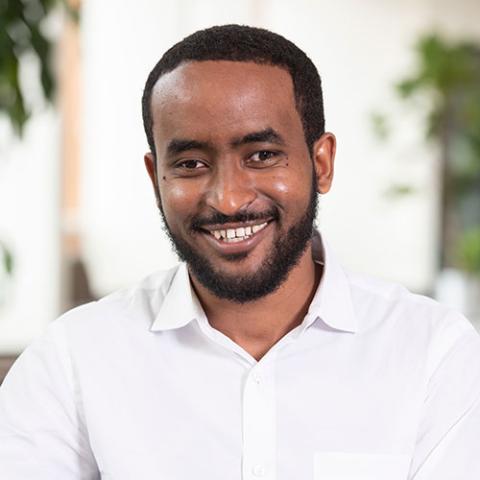McNair Scholar 2018 - Muzamil Ibrahim
Muzamil Ibrahim is an Ethiopian-American. Shortly after immigrating to the U.S. in 2008, he learned braille at Blind Incorporated, and English as a second language at Southside School. He earned a GED and then an Associate’s degree from Minneapolis Community and Technical College. He is enrolled in the CEHD at the University of Minnesota pursuing a Bachelor’s degree in Youth Studies. After graduation, he plans to enter graduate school and earn a Masters degree and possibly a Doctoral degree in social work or public policy.
Quote from Muzamil Ibrahim

My dream is to be a Youth Worker and advocate on behalf of the disadvantaged and disabled. I would like to work in a community-based organization committed to immigrant and low-income students and students with disabilities. I hope to shape government policies that affect disadvantaged and disabled youth. I hope to inspire and help young people overcome obstacles and find, as I have found, a brighter future.
Research project
Playing Indian: Dehumanization or development
Abstract: This research project conducts a historical analysis of the YMCA’s Christian Citizenship program manual entitled ‘Friendly Indians’ (1936). It examines the practice of “playing Indian”: the explicit appropriation of Native American culture for the development of white boys in the early 20th century. A theoretical thematic analysis (Braun & Clarke, xxxx) was conducted to analyze primary source materials and revealed how the Theory of Recapitulation (Hall, 1904) and its ideas of racial supremacy were operationalized into youth development. An analysis found that the Friendly Indians manual and its described activities produced two problematic representations: 1) Whiteness as progressive civilization (normalizing settler colonialism, assimilation to Christianity, nationalism and Western values) and 2) Native as Primitive (mystic, simple and violent). Although overt practices found in the Friendly Indians manual are becoming less common, youth development organizations continue to promote the developmental trajectory of the Christian Citizenship program and assimilation to Eurocentric goals, norms and practices. This diverts Native youth from Indigenous goals, norms, values and it contributes to harmful social stereotypes, everyday racism and associated psychological and physical health risks (Jones & Galliher, 2015; Paradies, 2006).
Faculty mentor
Dr. Katie Johnston-Goodstar is an Associate Professor in the School of Social Work at the University of Minnesota. Her research focuses on the social, political and historical contexts of Indigenous youth well-being. Katie has published several papers including: “Our Kids Aren’t Dropping Out, They’re Being Pushed Out” in the Journal of Ethnic and Cultural Diversity in Social Work and “Native Youth Media as Social Justice Youth Development” in the Journal of American Indian Education. She utilizes, participatory Indigenous and historical research methods and is currently conducting a multi-year Youth Participatory Action Research (YPAR) project on school push-out with local Native youth. Dr. Johnston-Goodstar has received a Multicultural Research Award from the University of Minnesota, a Rising Star award from the Women’s Philanthropic Circle and an Eagle Award from the St. Paul public school system among other community recognitions.